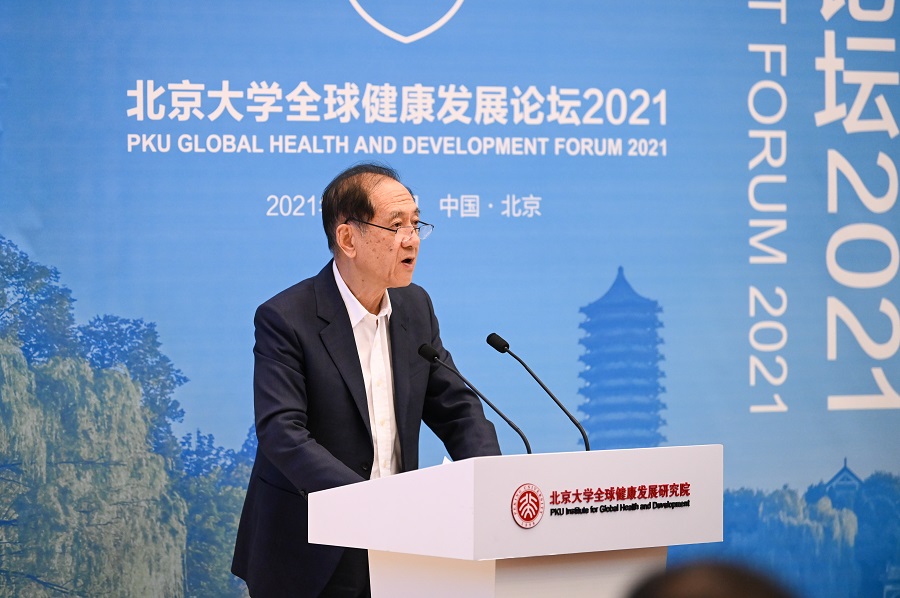
Dr. HAN Qide, Co-Chairman of the International Advisory Board for the Peking University Institute for Global Health and Development, Academician of the Chinese Academy of Sciences, spoke at the PKU Global Health and Development Forum 2021.
Distinguished guests, ladies and gentlemen, it is my great honor and pleasure to see you all here in this room, and also meet online with you Dr. Tedros, WHO Director-General, Peter Sands, Executive Director of Global Fund, Steve Davis, Senior China Strategy Advisor of BMGF (Gates Foundation), and Sid Chatterjee, the UN Resident Coordinator in China, ministers from Africa, and students from the PKU Institute of South-South Cooperation and Development.
The COVID-19 pandemic has been the largest event in global health and has far-reaching impacts much beyond health. The COVID outbreak began in 2019, coincidentally exactly 100 years after the end of the “1918 influenza” in 1919. The “1918 influenza pandemic” infected over 500 million people and killed more than 50 million. The most recent estimates for COVID are over 14 million infections claiming over 3 million lives. There is no doubt that the COVID pandemic has brought many problems and challenges. However, after fighting and co-existing with it for over one year, are we ready to view it in a different light? From a positive angle?
Many of you witnessed the launching of the PKU Institute for Global Health and Development a little over four months ago on December 22 last year, a direct result of the COVID-19 pandemic. As the co-chair of the International Advisory Committee of the Institute, I would like to highlight three points on global health and development issues that are the major topics for today’s Forum as well as the central research agenda for the new Institute.
Before COVID, the trend of de-globalization or even anti-globalization was on the rise. Virus does not need a passport to travel across borders. Unlike SARS or other epidemic in recent histories, COVID has affected all nations in the world and has a truly GLOBAL impact. Closing national borders, lockdowns, and social distancing have made us feel more isolated. What we took for granted before COVID – things like free travel and social gathering for example, have become a dream that is still hard to achieve for many. But the loss of regular in-person contacts has made us more keenly aware of their values – how previous human connections are. The global pandemic has also made it exceedingly clear that the fate of human race is connected with each other; that collaborations at a global scale is a must for us to fight and win the battle against COVID. “Virus has no borders; collaboration has no boundaries.” Although certain forms of collaborations are still restricted, innovations and advancement in technology have also helped us to collaborate in new ways. This is why south-south cooperation is a key theme highlighted in today’s forum.
My second point is to stress the core common value of human health. It is unfortunate that most people may not realize the value of health until it is too late – when they get sick or older. Nations and societies often behave the same way. The COVID pandemic is like a “bomb,” disruptive and devastating, but it is also an alarm bell. It heightens our awareness of the importance of health and how we need to improve our public health and healthcare system to be better prepared for COVID and other future threats to health. In response, we have seen the stronger interests from the younger generation to study health science and global health, and national investment in health facilities and infrastructure. However, these are not enough. What we need is sustained effort to embed health in all policies as proposed by Chairman Xi Jinping, to achieve universal health coverage for all as advocated by the World Health Organization, and to make health promotion a priority for all people, families, communities, societies, and nations.
Finally, I’d like to touch upon the important role of development in promoting human health in general and fighting against COVID19 in particular. Narrowly defined, it is an economic term, referring to economic development or as in development economics. Development can also go well beyond economic domain, encompassing social, cultural, technological, and other dimensions. Since the outbreak of COVID, we have witnessed development and innovations on many fronts. Not only scientific research and publications on COVID, but also development of vaccines and vaccination at an unprecedented speed. Not only new products but also new ways to deliver the products and services. Not only development in how we interact and collaborate with each other, but even how we live, study, and work. Digital health is a good example. I am glad to see many talks today not only on COVID vaccines but also on digital health today.
Years later, when we look back at 2020-2021, I trust that we will not only see the crisis but also great development in how we courageously overcome the crisis. Even if the pandemic may still be with us for some time to come, human history has taught us one thing: in the long run, development is the central theme that triumphs over death, destruction, and defeat. In closing, I wish the Forum success and all of you have a pleasant and productive time.
Thank you all.